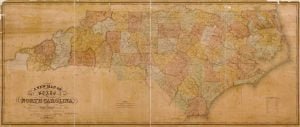Arthur Dobbs Appointed Governor
In 1754, Arthur Dobbs was appointed Governor by the crown. His administration of ten years presented a continued contest between himself and the Legislature on matters frivolous and unimportant. His high-toned temper for royal prerogatives was sternly met by the indomitable resistance of the colonists. The people were also much oppressed by Lord Granville’s agents, one of whom (Corbin) was seized and brought to Enfield, where he was compelled to give bond and security, produce his books, and disgorge his illegal fees. But notwithstanding these internal commotions and unjust exactions, always met by the active resistance of the people, the … Read more

